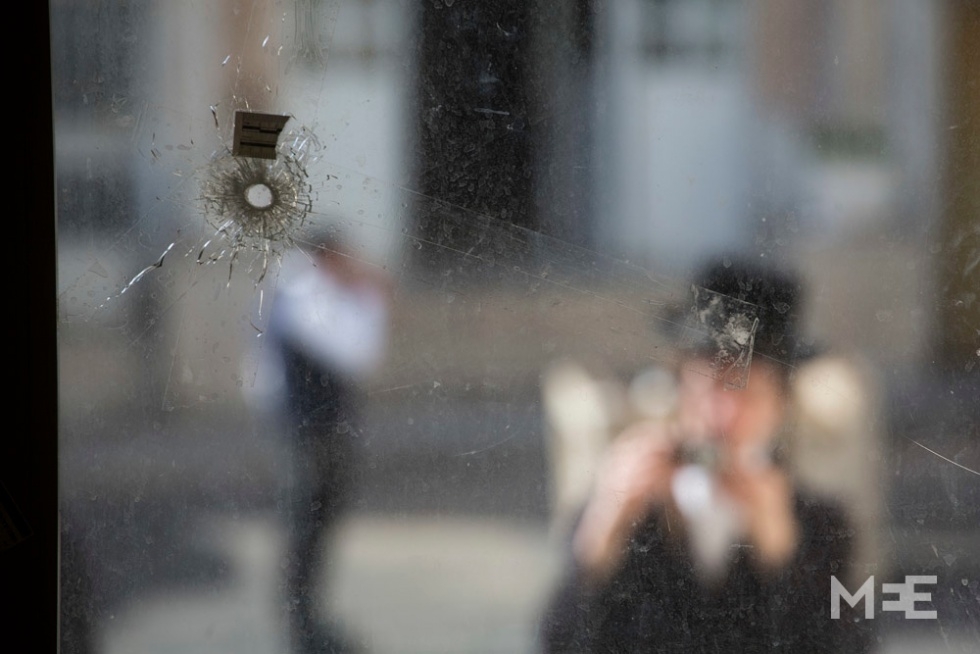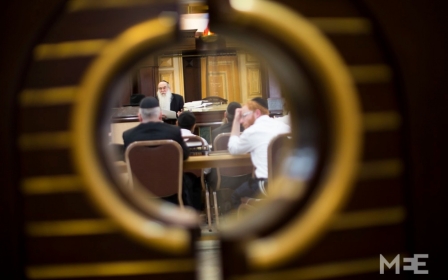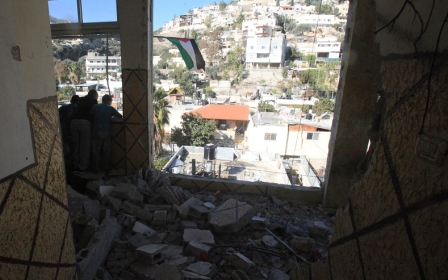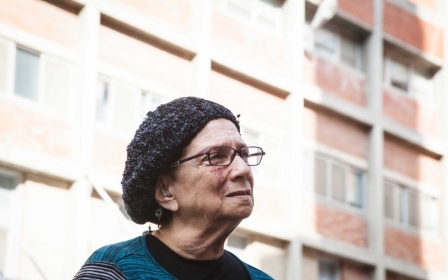The many shades of Temple Mount

Prayer books and prayers shawls soaked with blood, puddles of blood underneath shelves containing sacred books, prayer stands thrown to the ground: it is hard to think of more powerful images imprinted in collective Jewish memory than the pictures coming out of the massacre in "Bnei Torah" synagogue in Har Nof neighbourhood in Jerusalem on Tuesday. Jewish history came alive in its most gruesome manifestation.
Yet despite these images, Israel was quite calm yesterday and today. Ten years ago, such an event would have made the country lose its breath and cries for revenge would have been heard all over. The killing of four worshippers and a policeman was not met with indifference, but life went on. It might be that the identities of the victims played a part: ultra-orthodox Jews, always looked upon as outsiders. And it might be because Israel has run out of answers, especially regarding the events in Jerusalem.
Had such a deadly attack come from Lebanon or Gaza, Israeli F16s would have been already coming back from bombing missions on Hamas or Hezbollah headquarters. But this attack came from within East Jerusalem, an area which Israel claims to be an integral part of a unified city, and it is unlikely that Israel will bomb its own capital.
During Operation Protective Edge, Naftali Bennet, Israel's most hawkish minister, called for the army to occupy Gaza. As Israel occupied East Jerusalem for 47 years, it would be pointless to occupy it again. Thus, a military operation against the perpetrators of this attack, almost an automatic Israeli reaction in such cases, is simply impossible.
Netanyahu and his ministers chose to put all the blame on the shoulders of Palestinian President, Mahmoud Abbas. Yet, the clear words of Yoram Cohen, head of the Shin Bet secret service, were that Abbas had no involvement - whether on the table or underneath - in terror attacks in Jerusalem. His words threw cold water on Netanyahu's efforts.
Netanyahu must know well, that even if Abbas wished to, there is not much he can do in Jerusalem. Since the closing of the PLO offices in the Orient House in East Jerusalem in 2001, and even more since the building of the wall separating East Jerusalem from the West Bank, the Palestinian Authority's ability to influence the situation there has greatly narrowed, if not disappeared altogether.
This does not mean that the rhetoric against the Palestinian Authority will stop. Netanyahu may truly believe that Abbas is the source of all evil, but it is evident that this rhetoric serves him well. If Abbas is the enemy responsible for such horrific crimes, all demands to renew the negotiations with him made by Israeli Justice Minister Tzipi Livni and others would seem vain, or even treacherous. Netanyahu may also hope that by defaming Abbas, he could put obstacles on the latter's efforts to achieve international recognition for a Palestinian state.
Regarding Jerusalem, Israel has less space to manoeuver. Paradoxically, because Israel annexed East Jerusalem, her hands there are tied up there more than in the West Bank or Gaza. It cannot build a separation wall between East and West Jerusalem because this will amount to recognition that this is not a unified city. Because East Jerusalem is legally a part of Israel - and the martial law which applies in the West Bank is not applicable there - it is much more difficult to arrest people without trial or use other similar methods.
Netanyahu did announce that the homes of Ghassan and Odai Abu Jamal, the Palestinian cousins who killed the Jewish worshippers, will be demolished, but it will not happen tomorrow. A court must approve such a decision and it may take time.
But the government cannot sit idle. Israelis in general, and Jerusalemites in particular, do not feel safe anymore. In Jerusalem, fear is very much alive. Parents are afraid to send their children to school, the streets are half empty. Tourism is plummeting. The idea that the status quo in Jerusalem, maintained by use of force on the one hand and Western-like social welfare on the other, could be maintained for long, is melting away. Netanyahu, always portrayed as Mr Security, is in trouble.
Netanyahu is at a crossroads; He did not initiate the efforts to change the status quo on Haram a-Sharif/Temple Mount so as to let Jews pray there and even "divide" it into Jewish areas and Muslim areas with separate praying hours or days for each faith. It was done in spite of him.
But once Jewish nationalistic and ultra-religious groups began their constant and provocative visits to the compound, Netanyahu did not go out of his way to stop them. The fierce reactions of Palestinians in Jerusalem, based on real or imagined fears that Israel is about to replace the mosques on the hill with the Third Temple, did not set him searching for a compromise or a dialogue with them.
On the contrary, Netanyahu used the heated discussion on the subject in order to renew his alliances with the far-right, which went wrong during the last war on Gaza. With his coalition in a never ending crisis, it seems that Jerusalem is the key-word around which the Right will reunite - maybe even the key issue in early elections which Netanyahu might call in order to get rid himself of uneasy coalition partners.
Yet as the massacre in the synagogue showed that this could be playing with fire. Palestinian security sources say that the Abu Jamal cousins were supporters of the Marxist-leaning Popular Front for the Liberation of Palestine, far from religious. But the calls to "defend" Al-Aqsa from its enemies - in addition to reports earlier this week that a Palestinian bus driver was murdered by Israeli settlers (Israel claims that he hung himself) - sent them on this murderous trail.
If Israel continues to pressure the Palestinian population in Jerusalem in their daily lives, and above all, in and around Al-Aqsa, it might face other attacks, as we have seen yesterday. A new Intifada, this time driven by religious fervour, will pave its way. If Al-Aqsa is the main issue of concern, there is risk that not only will Palestinians rise up against Israel, but the Islamic State (IS) and other organisations may also join hands.
It is difficult to say how much Israeli leaders are aware of this danger. In a brilliant article in Haaretz last week, Dr Tomer Persico, a lecturer in Comparative Religions from Tel Aviv University, showed that all along Zionist history, it was Jewish secular politicians and thinkers who led the movements calling for the rebuilding of the third temple. Rebuilding of the temple is the utmost manifestation of Jewish sovereignty, more than the fulfilment of a religious commandment.
It seems that most of the leaders of the Temple Mount movements do not understand the possible implications of their actions at Al-Aqsa. They believe that by reaffirming Israeli sovereignty on the hill, the Palestinians will eventually succumb, as they did in Hebron, where the status quo at the Tomb of the Patriarchs (Ibrahimi Mosque) was changed in favour of Jewish prayers. But there are indications that some of them understand the situation perfectly, but prefer to "rock the boat" in order to achieve the sovereignty for which they long.
Netanyahu is not motivated by religion. But he is very keen on Jewish sovereignty. This is what may have attracted him in the Temple Mount movements and their followers. International pressure, and especially Jordanian intervention, forced him to step back, to profess his commitment to the status quo and to open the gates of Al-Aqsa for Muslims of all ages. The killing in "Bnei Torah" synagogue might push him in the other direction. If this is the case, we are headed for even darker days.
Meron Rapoport is an Israeli journalist and writer, winner of the Napoli International Prize for Journalism for a inquiry about the stealing of olive trees from their Palestinian owners. He is ex-head of the News Department in Haaertz, and now an independent journalist.
New MEE newsletter: Jerusalem Dispatch
Sign up to get the latest insights and analysis on Israel-Palestine, alongside Turkey Unpacked and other MEE newsletters
Middle East Eye delivers independent and unrivalled coverage and analysis of the Middle East, North Africa and beyond. To learn more about republishing this content and the associated fees, please fill out this form. More about MEE can be found here.





